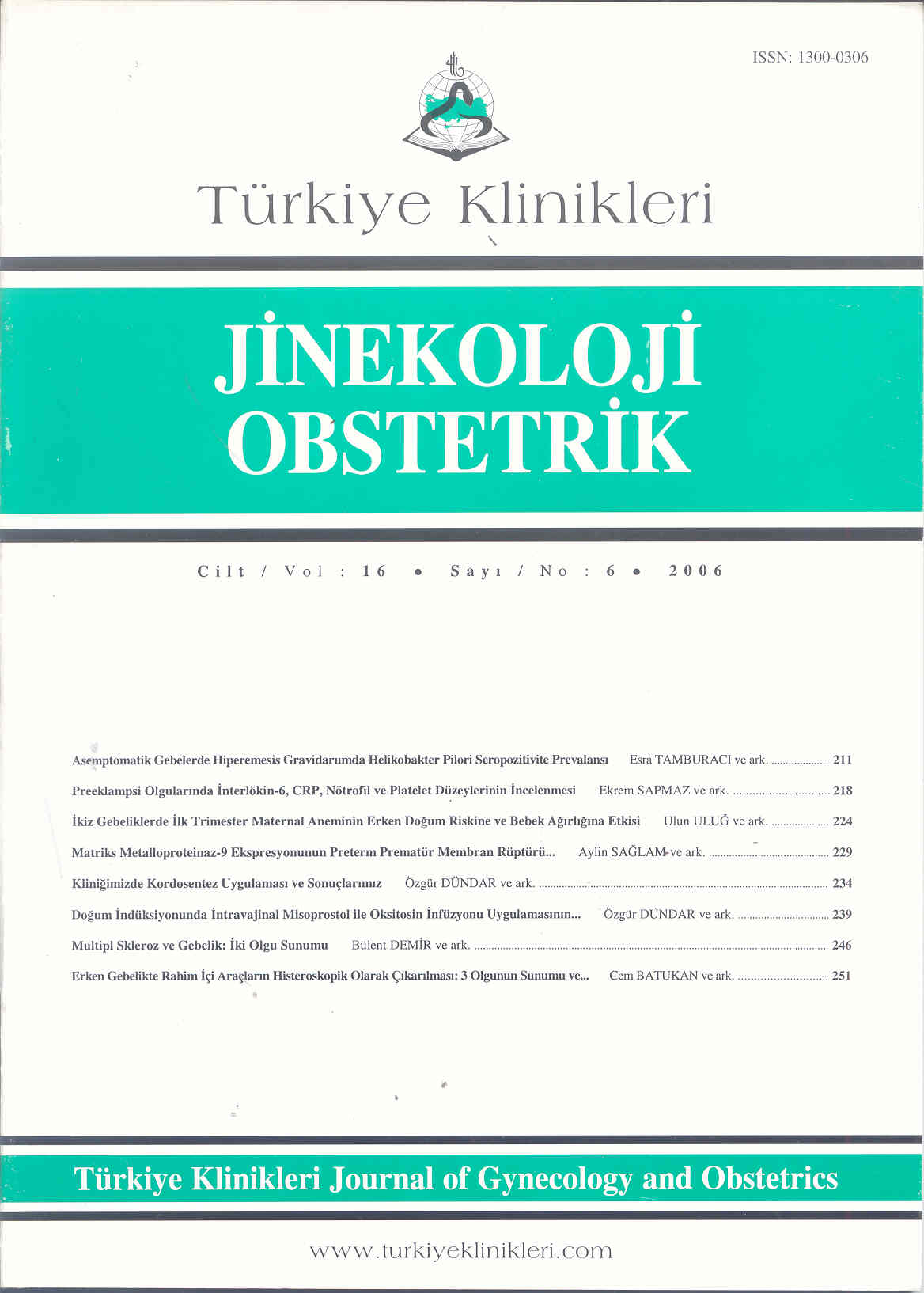Open Access
Peer Reviewed
CASE REPORTS
3485 Viewed1643 Downloaded
Multiple Sclerosis And Pregnancy: Report Of Two Cases
Multipl Skleroz ve Gebelik: İki Olgu Sunumu
Turkiye Klinikleri J Gynecol Obst. 2006;16(6):246-50
Article Language: TR
Copyright Ⓒ 2025 by Türkiye Klinikleri. This is an open access article under the CC BY-NC-ND license (http://creativecommons.org/licenses/by-nc-nd/4.0/)
ÖZET
Multipl skleroz; etiyolojisi bilinmeyen, genellikle genç erişkin dönemde başlayan ve en sık görülen kronik demiyelinizan nörolojik hastalıktır. Hastalık kadınlarda çoğunlukla doğurganlık döneminde ve gebeliğin planlandığı süreçlerde görülür ancak obstetrik pratiğinde nadir görülen bir durumdur. 1. olgu: 25 yaşında primigravid hasta, gebeliğinin 36. haftasında 6 yıldır multipl skleroz nedeni ile takip edilen kliniğimize refere edildi. Takiplerinde problemi olmadı ve 38 haftada normal spontan vajinal yol ile 2800 gr. canlı bebek doğurdu. Postpartum takiplerinde relaps görülmedi. 2. olgu: 23 yaşında gravida 2, para 1 olan hasta, 37. gebelik haftasında 4 yıllık multipl skleroz öyküsü nedeni ile polikliniğimize başvurdu. Multipl skleroz tanısını 1. doğum sonrası alevlenme döneminde almış, bu gebeliğinde de sık idrar yolu enfeksiyonu geçirmiş, 39. haftada da spontan vajinal yolla 3700 gr. sağlıklı bir erkek çocuğu doğurtuldu. Postpartum takiplerinde relaps görülmedi. Multipl skleroz gebelik sonuçlarını, doğum eylemini ve doğum şeklini değiştirmez ve gebeliğin üzerine de olumsuz etkisi mevcut olmayıp, postpartum dönemde alevlenmeler gösterebilir.
Multipl skleroz; etiyolojisi bilinmeyen, genellikle genç erişkin dönemde başlayan ve en sık görülen kronik demiyelinizan nörolojik hastalıktır. Hastalık kadınlarda çoğunlukla doğurganlık döneminde ve gebeliğin planlandığı süreçlerde görülür ancak obstetrik pratiğinde nadir görülen bir durumdur. 1. olgu: 25 yaşında primigravid hasta, gebeliğinin 36. haftasında 6 yıldır multipl skleroz nedeni ile takip edilen kliniğimize refere edildi. Takiplerinde problemi olmadı ve 38 haftada normal spontan vajinal yol ile 2800 gr. canlı bebek doğurdu. Postpartum takiplerinde relaps görülmedi. 2. olgu: 23 yaşında gravida 2, para 1 olan hasta, 37. gebelik haftasında 4 yıllık multipl skleroz öyküsü nedeni ile polikliniğimize başvurdu. Multipl skleroz tanısını 1. doğum sonrası alevlenme döneminde almış, bu gebeliğinde de sık idrar yolu enfeksiyonu geçirmiş, 39. haftada da spontan vajinal yolla 3700 gr. sağlıklı bir erkek çocuğu doğurtuldu. Postpartum takiplerinde relaps görülmedi. Multipl skleroz gebelik sonuçlarını, doğum eylemini ve doğum şeklini değiştirmez ve gebeliğin üzerine de olumsuz etkisi mevcut olmayıp, postpartum dönemde alevlenmeler gösterebilir.
ANAHTAR KELİMELER: Multipl skleroz, gebelik
ABSTRACT
Multiple sclerosis is the most common demyelinating neurologic disease that attacks young adults. The exact etiologic factors are unknown. The disease is generally presented in women with reproductive ages and who are planning to conceive. However multiple sclerosis and pregnancy is an uncommon condition in daily obstetric practice. Case 1: 25 years old primigravid women at 36th gestational weeks was referred to current clinic with the previous history of 6 years of multiple sclerosis. Routine antenatal care was unremarkable. At 38th week gestation 2800 g healthy infant was delivered via vaginal route. Postpartum care was also unremarkable for relapse. Case 2: 23 years old gravida 2, para 1 women at 37th gestational weeks admitted to current clinic with the previous history of four years of multiple sclerosis. The previous history revealed that the initial diagnosis of multiple sclerosis was made by disease relapse in postpartum period of first pregnancy. Furthermore, antenatal care was only remarkable for recurrent urinary tract enfections. At 39th week gestation 3700 g healthy male infant was delivered via vaginal route. Postpartum care was also unremarkable for relapse. Multiple sclerosis does not really affect the pregnancy outcome, labor, and delivery choice. In addition, there has been no significant effect of MS on pregnancy, but there may be acceleration in disease relapse in the postpartum period.
Multiple sclerosis is the most common demyelinating neurologic disease that attacks young adults. The exact etiologic factors are unknown. The disease is generally presented in women with reproductive ages and who are planning to conceive. However multiple sclerosis and pregnancy is an uncommon condition in daily obstetric practice. Case 1: 25 years old primigravid women at 36th gestational weeks was referred to current clinic with the previous history of 6 years of multiple sclerosis. Routine antenatal care was unremarkable. At 38th week gestation 2800 g healthy infant was delivered via vaginal route. Postpartum care was also unremarkable for relapse. Case 2: 23 years old gravida 2, para 1 women at 37th gestational weeks admitted to current clinic with the previous history of four years of multiple sclerosis. The previous history revealed that the initial diagnosis of multiple sclerosis was made by disease relapse in postpartum period of first pregnancy. Furthermore, antenatal care was only remarkable for recurrent urinary tract enfections. At 39th week gestation 3700 g healthy male infant was delivered via vaginal route. Postpartum care was also unremarkable for relapse. Multiple sclerosis does not really affect the pregnancy outcome, labor, and delivery choice. In addition, there has been no significant effect of MS on pregnancy, but there may be acceleration in disease relapse in the postpartum period.
MENU
POPULAR ARTICLES
MOST DOWNLOADED ARTICLES





This journal is licensed under a Creative Commons Attribution-NonCommercial-NoDerivatives 4.0 International License.










